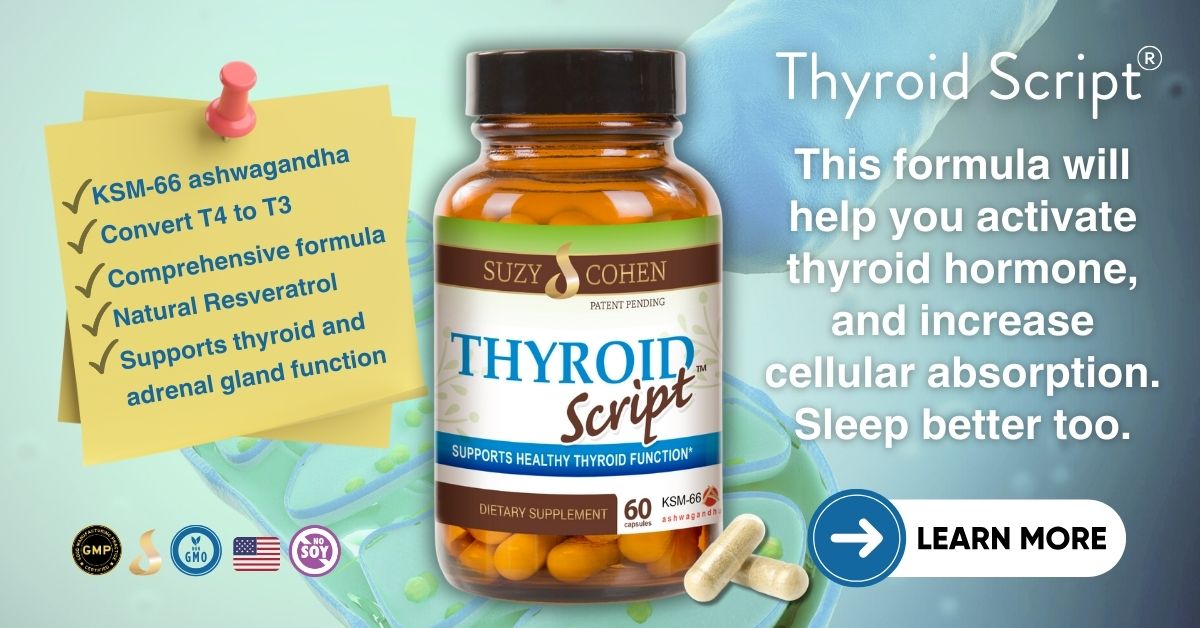What's On This Page?
ToggleTake With Food or On An Empty Stomach?
There is much confusion about when to take herbal supplements, vitamins and medications. Do you “take with food” or do you take them on an empty stomach? And how long do you wait before you eat? Today my goal is to help clear the confusion about the most popular supplements as well as medications.
First, let me start with thyroid medications because many of you are subscribers to my “Thyroid Thursday” and have special interest on thyroid disease: Always take those thyroid meds on an empty stomach. And now, let me move on to the rest of the medications that people in the USA and abroad take.
Water is Important
No matter what you take, you should be drinking a full glass of water to make sure the pill doesn’t linger in your esophagus and cause irritation. So regardless of whether you “take with food,” or take it on an empty stomach, it should always be taken with an adequate amount of water. Also, in order to prevent heartburn, don’t lie down right after swallowing your pills. You should sit upright for a few minutes. First, you might wonder why an item might be taken with food. There are 4 main reasons:
- Food may improve the intestinal absorption
- To minimize nausea or reflux
- To prevent stomach irritation or ulcers
- Because it has an action on food you’re eating (like a diabetes drug)
What Does “Take With Food” Mean Exactly?
When a dietary supplement, enzyme or medication states the directive to “take with food” it usually means to take while your eating, or a few minutes beforehand. But since you have food in your gastrointestinal tract for a little while, it would be fine to take the item right after you eat. There’s no right or wrong.
Take with Food – This means a full meal.
Snack – This could mean a can of Ensure for some people, or crackers with jelly or cheese, pretzels, popcorn, perhaps some apple sauce or peaches… a few bites of yogurt, a little drink of milk, or a banana. It doesn’t have to be a lot is my point. It’s a snack that just goes down with the pill, it doesn’t have to fill you up like a meal.
Fatty Meal – Some fat soluble vitamins and many medications are best on a fatty meal, so in this case think of meals that contain eggs (scrambled eggs, or quiche), a baked potato with butter or sour cream, grilled cheese, a hamburger or meatloaf, a bagel with cream cheese, pizza or peanut butter with celery or even a PB & J sandwich. Guacamole too, since avocados have a high fat content. These are all high in fat. Read your labels carefully to see if there are any specifics given.
Take with Food or a Snack
Ashwagandha.
This popular adaptogen should be thought of a little bit like ‘food’ because it is an herb. Just about all herbs should be taken with a snack or a meal in order to amplify the benefits and reduce nausea. Herbs come from plants, and their esesntial components are better absorbed with food.
That said, some proprietary forms of herbs, in this case ashwagandha (in the trademarked patented form of KSM-66) may be taken without regard to meals. This is what I used in Thyroid Script.
Multivitamins.
Some people take this for general health, or to fill nutritional gaps. There are so many constituents to a multivitamin that it’s best to take them with food in order to minimize stomach upset and nausea.
CoQ10.
Some people take this powerful antioxidant for cellular energy production to support their heart, pancreas, liver and brain. CoQ10 is a nutrient that you make in your body and it’s also sold as a dietary supplement. CoQ10 or ubiquinone should be taken with food, or a fatty meal because it’s absorbed at least twice as fast (than on an empty stomach). If you’re taking “Ubiquinol” then you can take it without regard to meals.
Selenium.
Some people take selenium or selenomethionine for thyroid inflammation, or low levels of thyroid, as well as bone health, prostate support and autoimmune conditions. It’s ideally taken with food, like most other minerals.
Magnesium.
Some people take magnesium for depression, regularity, reduction of leg cramps and blood pressure support. Like most minerals, it is a little irritating to the gut, especially if it’s not chelated. Taking magnesium with a snack, or some food can minimize diarrhea and stomach discomfort.
Vitamin K.
Some people take vitamin K because it helps you produce prothrombin, a protein that is a clotting factor which is useful for bone metabolism and blood clotting. It’s ideally taken with food. In fact, there was a study done to show that more vitamin K was taken up from buttered spinach versus spinach that was not drizzled in the fat.
Betaine Hydrochloride.
A lot of people who are anemic take this, as well as people with hypochlorhydria (low acid). Betaine should be at the beginning of your food, or fatty meal in order to improve the acid level in the stomach and help you digest everything. Better digestion and breakdown means you will extract more iron, and all the minerals and nutrients in the meal. Take this supplement 5 to 10 minutes before eating a full meal or fatty meal.
You shouldn’t take it with snacks. Did you know that people who have POTS are deficient in betaine sometimes? Sometimes in choline too. If you get dizzy or light-headed when you stand up, you might have POTS and so you can learn more today by CLICKING HERE.
Vitamin D – You can take this without regard to meals, according to the newest research, however most of the older scientific literature say to take it with food since it’s fat-soluble. Today, most vitamin D supplements are suspended in oil within the soft gel.
Collagen.
Supplements of collagen are useful if you’re seeking pretty hair, lovely skin, strong nails, and flexibility.* There’s a lot of controversy over the time to take collagen which made from peptides. Ideally, take Collagen supplements with a little snack or some food. The collagen – if made well – will still be absorbed.
Fish Oil.
Some people take fish oil to help with cholesterol, triglycerides, depression and blood joint health.* Taking fish oil supplements (EPA, DHA or both) with food or fatty meals is ideal because it boosts the absorption.
Medications That You Should Take With Food
(this is not a complete list)
Allpurinol.
This is a drug that is taken for gout. Ideally, it is taken with a meal, as well as a full glass of water.
Antacids.
These help with heartburn or reflux. They should always be taken with food so that it can neutralize the acid that is secreted while you’re eating. If you take it on an empty stomach, the antacid leaves your stomach too quickly and isn’t able to do its job properly.
Amoxicillin.
The most popular antibiotic, especially for children. It may be taken without regard to meals, however, I recommend recommend it be administered with food, especially to the toddlers and teens in order to reduce indigestion, nausea and vomiting.
Mepron (Atovaquone).
People take this antibiotic to treat a co-infection of Lyme called Babesia. It can also be used to prevent pneumonia ( specifically Pneumocystis jiroveci). FYI, this drug is a strong drug mugger of CoQ10.
Corticosteroids – Be sure to take with food.
These are used for pain, allergic reactions, rashes and overactive immune systems. These should always be taken with food or milk. Some examples include prednisone, hydrocortisone and dexamethasone.
Aspirin.
Ideally aspirin is taken with food since it can irritate the delicate lining of your esophagus. Aspirin is derived from white willow bark, an herb.Aspirin belongs to the category of NSAIDs (see below). Did you know that many people are allergic to aspirin? If so, be careful eating certain foods because foods contain the same base (salicylate) as aspirin. CLICK HERE to read my article, 36 Foods That Contain Aspirin.
NSAIDS.
People take these edications like ibuprofen, diclofenac, ketoprofen and indomethacin to treat their inflammation and pain. They should be taken with food. A new JAMA article was published regarding a big meta-analysis that concluded that aspirin was beneficial in reducing cardiovascular problems over time. Here’s the JAMA STUDY.
Opiates.
People seeking pain relief take oxycodone, hydrocodone, morphine, and others. These are ideally taken with food in order to minimize the stomach upset, nausea and possible vomiting. Avoid alcohol when taking opiates due to additive CNS depression. Just one more caution, if you are taking the ext3ended release forms (Oxycontin for example), you have to swallow them whole. Do not chew, break, split, crush, or dissolve them. You can take Oxycontin without regard to meals.
Metformin.
As a general rule, all oral drugs (including METFORMIN) that treat diabetes should usually be taken around mealtimes to blunt the glucose spike that naturally occurs after eating and to avoid a very low blood sugar (hypoglycemia). If you take it on an empty stomach, you might get hypoglycemic.
Metformin should always be taken with meals to help reduce stomach discomfort, indigestion or bowel side effects that may occur, especially during the first month of treatment. This is a prime example of #4 above, how the medication has an impact on the food you’re eating.
Enzyme Replacement (Supplements or Rx Medication).
These supplements are used to help many folks break down (metabolize) the starch, fat or protein in a meal. So in this case you should be taking them with your meal.
For people who are seeking their anti-inflammatory effect, it is fine to take enzymes on an empty stomach. Finally, if the enzyme is needed to help with pancreatic function, for example Creon or Pancrease, it would have to be taken with each meal.

Suzy Cohen, has been a licensed pharmacist for over 30 years and believes the best approach to chronic illness is a combination of natural medicine and conventional. She founded her own dietary supplement company specializing in custom-formulas, some of which have patents. With a special focus on functional medicine, thyroid health and drug nutrient depletion, Suzy is the author of several related books including Thyroid Healthy, Drug Muggers, Diabetes Without Drugs, and a nationally syndicated column.



